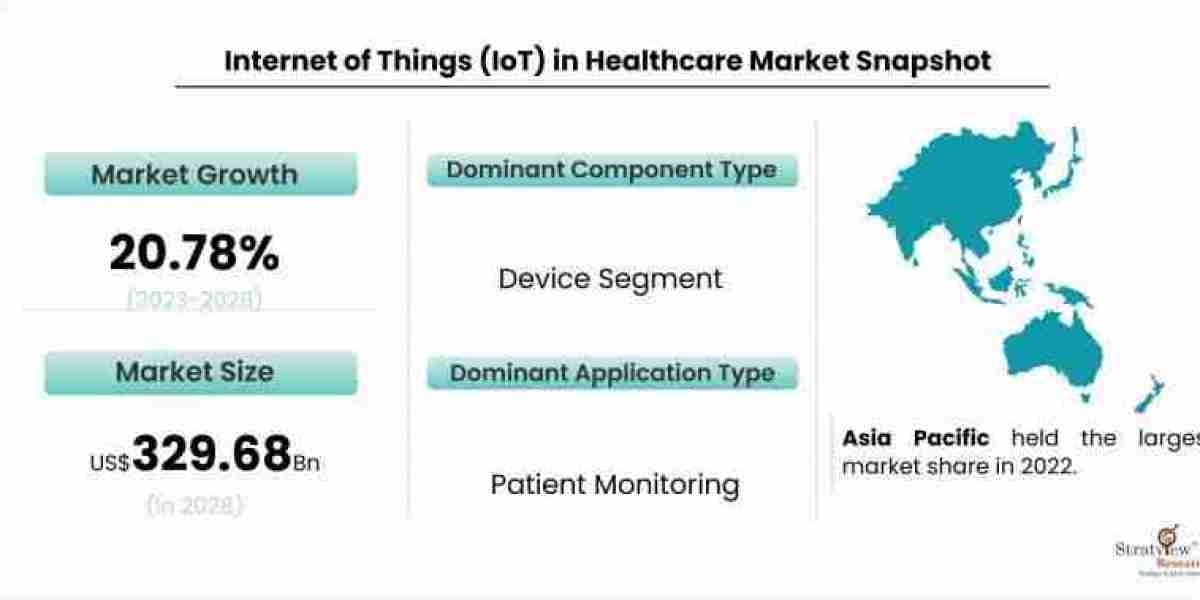The Internet of Things (IoT) has already made significant strides in revolutionizing the healthcare industry. From remote patient monitoring to smart devices and predictive analytics, IoT has transformed the way healthcare is delivered and experienced. As we look ahead, the future of IoT in healthcare holds even more exciting possibilities. Let's explore some of the trends and predictions that are set to shape the future of healthcare. The IoT in healthcare market is estimated to grow from USD 106.17 billion in 2022 to USD 329.68 billion by 2028 at a CAGR of 20.78% during the forecast period.
Continued Growth of Wearable Devices: Wearable devices, such as fitness trackers and smartwatches, have gained popularity in recent years. In the future, we can expect even more advanced and specialized wearable devices tailored specifically for healthcare applications. These devices will not only monitor vital signs but also track specific health conditions, deliver personalized health recommendations, and enable real-time communication with healthcare providers. Wearable devices will become an integral part of preventive care, chronic disease management, and overall wellness.
Expansion of Telemedicine and Remote Care: The COVID-19 pandemic has accelerated the adoption of telemedicine and remote care solutions. This trend is expected to continue in the future. IoT will play a crucial role in enabling remote consultations, virtual examinations, and remote patient monitoring. Advancements in IoT technology will further enhance the capabilities of telemedicine, including high-resolution video conferencing, real-time data transmission, and integration with IoT devices for accurate remote diagnostics. This expansion of telemedicine will improve access to healthcare, especially for underserved populations and those in remote areas.
AI and Machine Learning Integration: The combination of IoT and artificial intelligence (AI) will be a game-changer in healthcare. AI-powered algorithms will analyze vast amounts of patient data collected through IoT devices, electronic health records, and other sources. Machine learning models will identify patterns, detect anomalies, and provide valuable insights for clinical decision-making. AI-driven IoT applications will enable early disease detection, personalized treatment plans, and predictive analytics for improved patient outcomes.
Enhanced Data Security and Privacy Measures: As IoT devices continue to generate and transmit sensitive patient data, confirm robust data security and privacy measures will be paramount. Healthcare organizations will need to invest in advanced encryption techniques, secure communication protocols, and strict access controls. In addition, compliance with data protection regulations, such as the General Data Protection Regulation (GDPR), will become even more critical. The future of IoT in healthcare will require a strong emphasis on safeguarding patient information.
Interoperability and Standardization: One of the challenges in IoT implementation in healthcare is the lack of interoperability and standardization among devices and systems. In the future, efforts will be made to establish common protocols and standards that enable seamless integration and communication between various IoT devices and platforms. Interoperability will facilitate the exchange of data across different healthcare systems, leading to better coordination of care and improved patient outcomes.
Focus on Preventive and Personalized Medicine: With the help of IoT, healthcare will increasingly shift towards a preventive and personalized approach. IoT devices will continuously monitor individuals' health data, providing real-time feedback and insights. Healthcare providers will leverage this data to develop personalized wellness plans, preventive strategies, and early intervention programs. The future of IoT in healthcare will empower individuals to take control of their health and well-being proactively.
In conclusion, the future of IoT in healthcare holds immense potential for transformative advancements. From wearable devices to telemedicine, AI integration, data security, and preventive medicine, IoT will continue to reshape the healthcare landscape. As technology evolves and healthcare systems adapt, the benefits of IoT will extend to improved patient outcomes, increased access to care, and enhanced overall wellness. Embracing these trends and predictions will pave the way for a more patient-centric, efficient, and effective healthcare ecosystem in the future.









